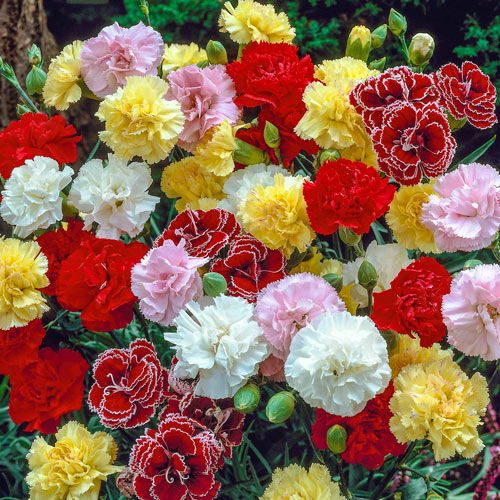Blooming carnations,
An assortment of colors
To represent love
I wonder if this bouquet
Will show you my true feelings
Notes: In hanakotoba (花言葉), the Japanese language of flowers, the carnation (和蘭石竹) represents “a pure and deep love” (無垢で深い愛). The color of the carnation is also important in hanakotoba. The red carnation represents “love towards one’s mother” (母への愛), the white carnation represents “pure love” (純粋な愛) and the phrase “my love is still alive” (私の愛は生きています), the pink carnation represents “a woman’s love” (女性の愛), “ardent love” (熱愛), and “a beautiful performance” (美しいしぐさ), the yellow carnation represents “scorn/disdain” (軽蔑), the purple carnation represents “pride” (誇り) and “elegance” (気品), and the green carnation represents “eternal happiness” (永遠の幸福).
In the western language of flowers, the carnation symbolizes “fascination” (魅惑、魅力), “love” (愛情), and “distinction” (卓越、名声). The color of the carnation is also important in the western language of flowers. The red carnation symbolizes the phrase “My heart aches for you” (あなたに会いたくてたまらない), “deep love” (深い愛), and “admiration” (敬愛、感嘆), the white carnation symbolizes “sweet and lovely” (かわいくて愛らしい), “innocence” (純潔), and “pure love” (純粋な愛), the pink carnation symbolizes the phrase “I’ll never forget you” (あなたを決して忘れません), “a woman’s love” (女性の愛), and “a mother’s love” (母の愛), the yellow carnation symbolizes the phrase “You have disappointed me” (あなたには失望しました), “rejection” (拒絶、拒否), and “disdain” (軽蔑), and the purple carnation symbolizes “capriciousness” (気まぐれなこと) and “changeable” (変わりやすい). [Japanese source]

2 thoughts on “Carnation 「和蘭石竹」”